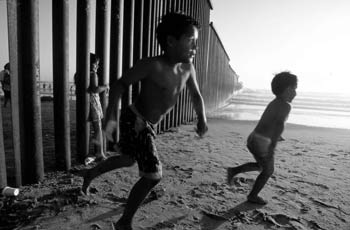 |
 |
 |
 Editorials | Issues | June 2007 Editorials | Issues | June 2007  
Young Deportees
 Hinde C. Peter - Latinamerica Press Hinde C. Peter - Latinamerica Press


| | Mexican children defy the migra and illegally enter the United States from Tijuana. (Todd Bigelow) |
Children who fail to meet up with their immigrant parents face a precarious situation.

Behind the immigration reform debate is the daily drama of children being forcibly separated from parents.

This past March in the coastal town of New Bedford in Massachusetts, more than 100 children were left stranded as Immigration and Naturalization Service agents raided homes and work-places to take undocumented parents into custody, causing a public outcry that echoed even in the US Senate. Churches began again offering sanctuary for families with adults in danger of capture and deportation.

The scenario is not uncommon, though. Lourdes, 7, and Yesica, 14, whose last names have been omitted to protect their identities, had recently been deported from the US at El Paso across the Rio Grande bridge to Mexican officials in the border town, Ciudad Juarez.

With the help of a “coyote” they girls tried to cross into the United States to join their parents in Utah. They were living with an aunt in Mexico and had not seen their father in eight years and their mother in two years. Lacking documents neither parent could risk going back to family in the Mexican state of Michoacan.

Because of tightened border security, Mexicans who in decades past traveled back and forth between home and work in the United States, now cannot risk the perilous to impossible journey. Yesica and Lourdes’ father would risk losing his job in construction that provides for the parents and family members in Mexico who depend on the money they send.

Yesica and Lourdes were desperate to be with their parents. They were in the custody and care of the Casa YMCA de Menores Migrantes, a hospice for minors only a five minute walk from the bridge connecting Juarez and El Paso. They were painting masks for a celebration and looked like any kids with no worries in the world, as much of the paint on themselves as on the masks.

Leticia López, director of Casa YMCA, a nongovernmental organization sponsored by the YMCA in the United States, says that she was in contact with their parents and was waiting for instructions from their aunt in Michoacan, Mexico. Lourdes and Yesica were picked up two days later by an uncle to be taken home to Michoacan, said López.

A heavy caseload

Casa YMCA houses on the average 10-15 minors at any given time, currently about 50 a month from every state in Mexico. Most are girls. But the organization receives only 5 percent of the total number of children deported to Juarez. An article in the April 27 issue of Diario de Juarez said that some 13,000 minors were deported to Juarez in the last two years, and a third of them were under the age of 12. Almost 5,000 children returned to Mexico had traveled to the United States alone.

The children are not allowed out of the house for the few days they are there, a regulation imposed by the Mexican government office Desarrollo Integral de la Familia, known as the Spanish acronym DIF, which sends children to Casa YMCA.

Casa YMCA runs outreach programs in Juarez to raise awareness about the problem of minors who migrate. López gives as many as 14 workshops during the year in the university, middle and preparatory schools and other community venues on the subject of migrating minors, their dignity and rights, their testimonies.

There are 28 hospices in all in Ciudad Juarez where a migrant child can be housed and cared for. Casa YMCA is in the process of forming a coalition with other organizations, first of all with Casa Migrante that houses adults under the auspices of the Catholic diocese and managed by Dominican priests and nuns. Casa Migrante has a human rights office for the defense of migrants.

The Diario de Juarez newspaper reported March 25 a case involving a Mexican migration service agent who was charged with extorting 200 pesos (US$18) from one person and 400 pesos ($37) from another. This new coalition will promote a campaign in the second half of this year to raise public support for official investigations of the situation of minor deportees in Juarez. | 
 | |
 |



